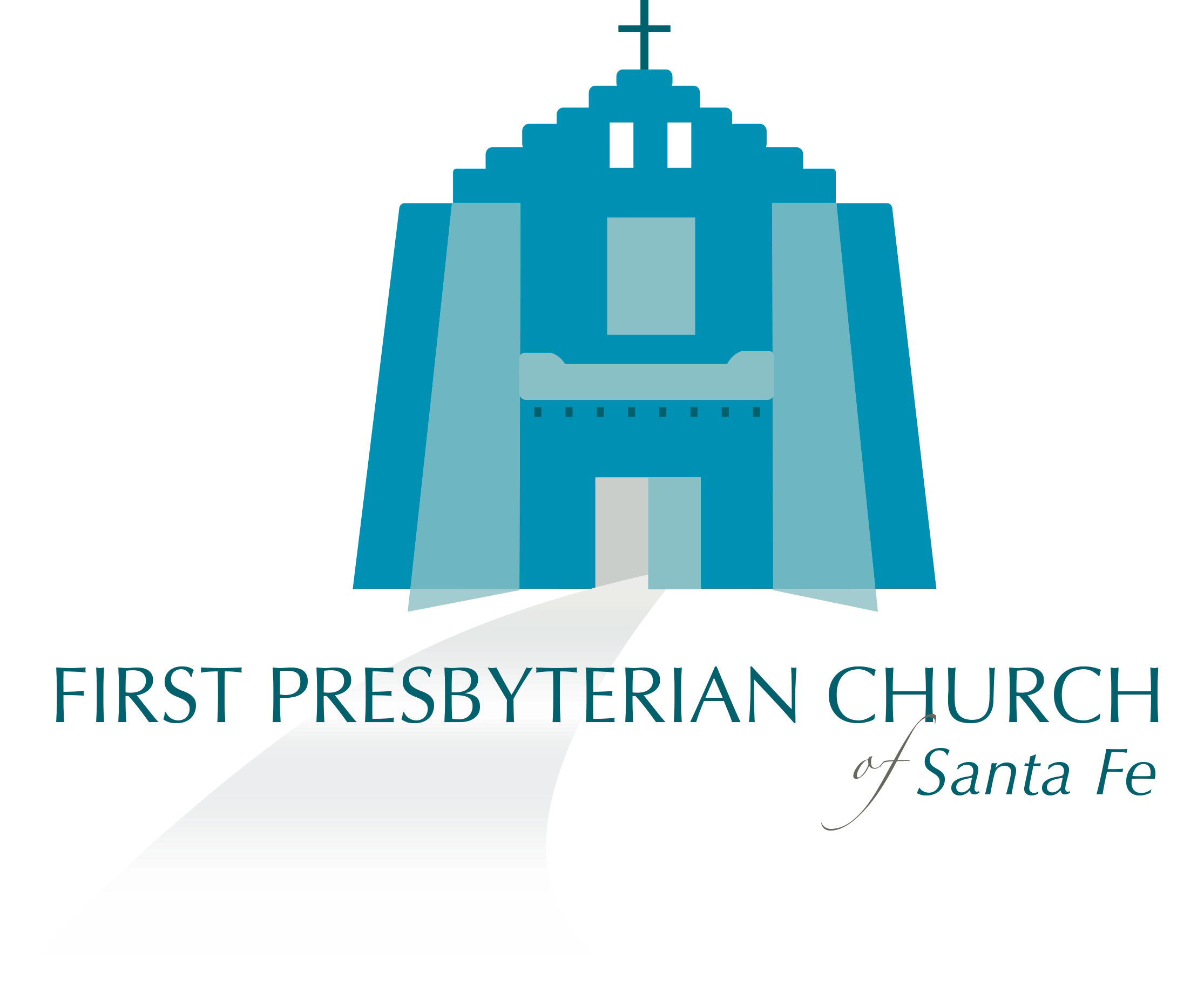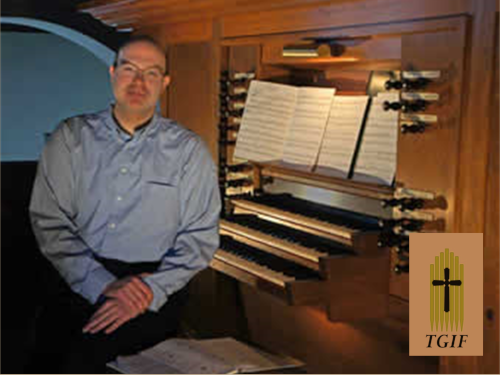TGIF, October 27
We welcome Carson Cooman to perform music by Boykin, Frahm, Beaumont, Ferrari and Aberg at our Friday concert. Sanctuary doors open at 5:15 pm and the concert begins at 5:30. The concert is free with donations accepted.
The program is:
As God Imagined (2022)—B.E. Boykin (b. 1989)
Rose Garden (2020)—Frederick Frahm (b. 1964)
Canzona after Rimsky-Korsakov (2023)—Karen Beaumont (b. 1965)
Tres santos nuevomexicanos (2023)—Carlotta Ferrari (b. 1975)
Santa Lucía (Huapango)—World premiere
San Lorenzo (Conchero)
San Miguel (Danza de Los Migueles)
Chorale Prelude on “Liebster Jesu” (2001) Frederick Frahm
Toccata No. 6, “Sancta Clara” (1984) Thomas Åberg (b. 1952)
We offer concerts every Friday evening. For a schedule of upcoming concerts, see TGIF Concert Series.
Notes on the Composers and Pieces
American composer Brittney (“B.E.”) Boykin (b. 1989) is a native of Alexandria, Virginia and comes from a musical family. At the age of seven, she began piano lessons and continued her studies through high school under the tutelage of Alma Sanford. She earned degrees from Spelman College (BA), Westminster Choir College of Rider University (MM), and Georgia State University (PhD). Boykin’s choral piece, We Sing as One, was commissioned to celebrate Spelman College’s 133rd Anniversary of its founding at the 2014 Founders Day Convocation. She has also been featured as the conductor/composer-in-residence for the 2017 Harry T. Burleigh Commemorative Spiritual Festival at Tennessee State University. Boykin has been commissioned and collaborated with several organizations, including a number of ACDA divisions, the Minnesota Opera, and the Kennedy Center. She is currently an Assistant Professor of Music at the Georgia Institute of Technology.
As God Imagined (2022) was commissioned by Pamela Ruiter-Feenstra and the Hymn Society for the 2022 centennial conference and was premiered here in NCCC this past summer as the conclusion to one of the conference hymn festivals. The title refers to the conference theme: “sing the world God’s imagines.” The composer writes: “When Pamela Ruiter-Feenstra approached me with the conference theme, I processed a world continuing to adjust to the hardships of war, Covid-normalcy, racism, mental health, climate change, and so many others…this was my heartfelt response.”
Frederick Frahm (b. 1964) was born in Hemet, California and was educated at Pacific Lutheran University. He directed church music programs across the country for 40 years, before retiring in 2021. A prolific composer, Frahm has written a significant catalog of compositions that includes music for organ, choral music, chamber pieces, art song and song cycle, symphony and concerto, and extended vocal works including operas and cantatas. His music appears in the catalog of more than dozen publishers, and he is co-director of the publisher Firehead Organ Works. As a performer, he has appeared in organ recitals across the country and as organist and harpsichordist for the New Mexico Philharmonic and Santa Fe Symphony Orchestra. From 2011 to 2022, he was active as a teaching composer-artist for the Santa Fe Opera company, working with elementary and middle school age children to write their own chamber operas for public performance. Frahm’s powerful and distinctive music draws on his background in sacred music, his lifelong interest in abstraction (especially in visual art), the landscapes of the American West, and great literature from all historical periods.
Rose Garden (2020) draws together two significant influences in Frahm’s work: flowers (his father was a nurseryman) and contemporary abstract art, in this case a 1920 painting of the same name (“Rosenhagengarten”) by the Swiss-German artist Paul Klee (1879–1940).
Chorale melodies have been a constant part of Frahm’s life and musical background since childhood. Chorale Prelude on “Liebster Jesu” (2001) comes from the near the “end” of his first period of chorale preludes—largely melodically-driven pieces drawing on the historical baroque tradition but enlivened through his characteristic and colorful harmony of the present. (His chorale-based works from the next several decades have moved in a different direction: treating the chorale as raw source material for significant tessellation and abstraction.)
American organist and composer Karen Beaumont (b. 1965) received her degree in Music History from the University of Wisconsin and studied organ with Gerre Hancock, John Behnke, Jeffrey Peterson, and Carol Haakenson. Beaumont has performed as a recitalist in numerous venues throughout the USA and the UK. From 1988 to 2011 she provided the organ and choral music for St. James Episcopal Church in Milwaukee, Wisconsin. Her album of classic French noëls was released on the Pro Organo label in 2020. Her musical compositions have been published by Lorenz, Leupold Editions, Fagus-Music, and SMP Press.
Canzona after Rimsky-Korsakov (2023) alludes to one of the Russian composer’s most famous pieces, the “Procession of the Nobles” from his 1890 opera-ballet Mlada.
Carlotta Ferrari (b. 1975) is an Italian composer. Educated at the Conservatory in Milan, she has composed in many genres, developing a personal language that is concerned with the blend of past and present. Her compositions have been performed frequently around the world. Ferrari’s music appears on several CD recordings, including eight all-Ferrari organ CDs: four recorded by Carson Cooman (2014/16/18), three by Peter Clark (2015/16/18), and one by Luca Massaglia (2021). She served as chair of music composition at Hebei Normal University in Shijiazhuang and professor of music composition at the European School of Economics in Florence, Italy.
Tres santos nuevomexicanos (2023) was written for Carson Cooman to perform in New Mexico. The composer wrote the following: “Although I have never visited, this work is inspired by much reading about and online looking at New Mexico. Magnificent landscapes apart, I find multiculturalism fascinating, and so this composition reflects that. The piece is a set of three stylized dances of Nahuatl and Hispanic origin, combining with the tradition of Santos, the painted icons. The dances are based on three Gregorian melodies dedicated to the saints Lucía, Lorenzo and Miguel, typically evoked in the Santos tradition.”
Thomas Åberg (b. 1952) was born in Stockholm, Sweden and works there as composer and concert organist. Most of his works are written for the organ and are often characterized by their rhythmic joy, simplicity, and humor. He has stated that “music must bring enjoyment, without abandoning reverence,” and as such his style often uses the most basic of musical materials to create a discourse that is both spiritual and visceral. Åberg’s music speaks with a distinctly Swedish voice and emotional aesthetic, and since the early 1980s his works have become an important part of the Scandinavian organ literature. His music has been performed by organists at festivals throughout Europe, Asia, and the USA. He also tours regularly worldwide as concert organist with his own works. In December 2012, Carson Cooman released a CD (Legends in the Garden) devoted to Åberg’s organ compositions and also has recorded more than 70 other Åberg works for YouTube.
Toccata No. 6, “Sancta Clara” (1984) is dedicated to the Swedish organist Per Thunarf (1941–2014) who was one of Åberg’s closest friends and collaborators. The subtitle refers to the church of Sancta Clara (Klara kyrka) in Stockholm where Thunarf was organist for more than 30 years and played more than 4,500 organ concerts. Åberg’s close association with Thunarf, Sancta Clara Church, and the church’s Åkerman & Lund organ inspired a number of compositions. It was at Thunarf’s instigation that Åberg’s cycle of toccatas began in 1981. Toccata No. 6 is one of the most joyous of the entire toccata series with its very optimistic harmonies and consistent rhythmic excitement. As in most of Åberg’s work, the expressive dimension is explored through modal shifts and juxtapositions.
Carson Cooman is an American composer and organist. He holds degrees in music from Harvard University and Carnegie Mellon University and since 2006 has held the position of Composer in Residence at the Memorial Church, Harvard University. As an organ recitalist, Cooman specializes in the performance of contemporary music. Over 300 new compositions by more than 100 international composers have been written for him. Cooman has made many recordings as organist, including more than 10 complete CD releases of music by Thomas Åberg, Paula Diehl, Carlotta Ferrari, Lothar Graap, Eva-Maria Houben, Marian Sawa, and Andreas Willscher, along with several multi-composer albums. His recordings of more than 5,500 additional contemporary organ compositions can be heard freely from YouTube and his website. As a composer, Cooman has created a catalog of works in many forms—ranging from solo instrumental pieces to operas, and from orchestral works to hymn tunes. His work has been performed on all six inhabited continents and appears on over forty recordings, including more than twenty-five complete CDs on the Naxos, Albany, Artek, Gothic, Divine Art, Métier, Diversions, Convivium, Altarus, MSR Classics, Raven, and Zimbel labels. For more information, visit carsoncooman.com

